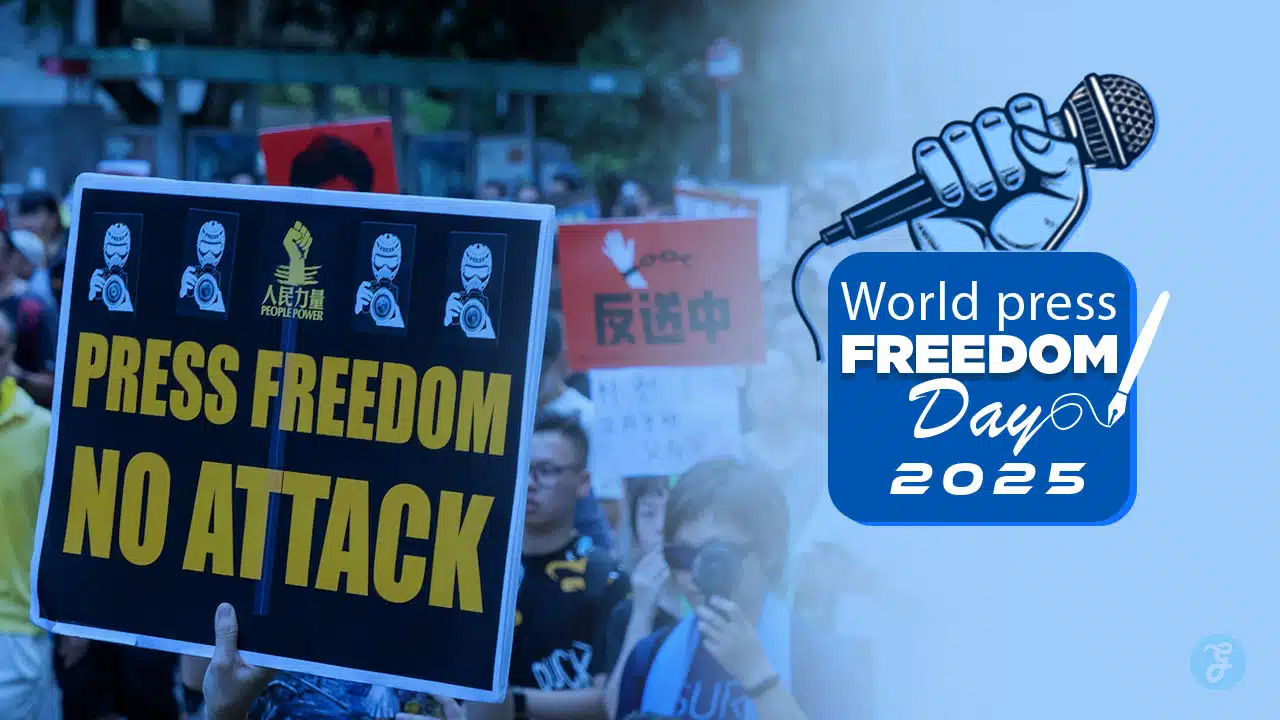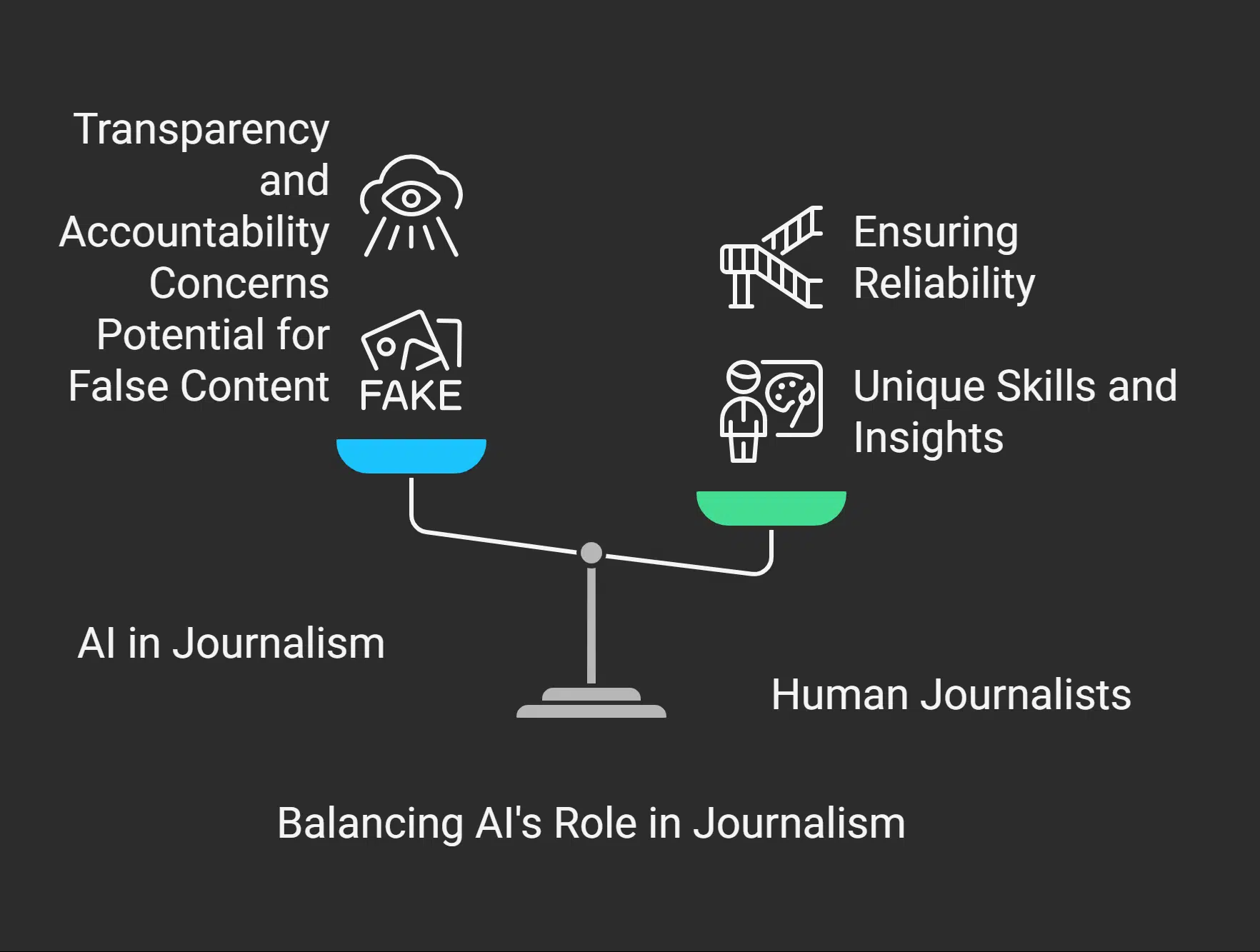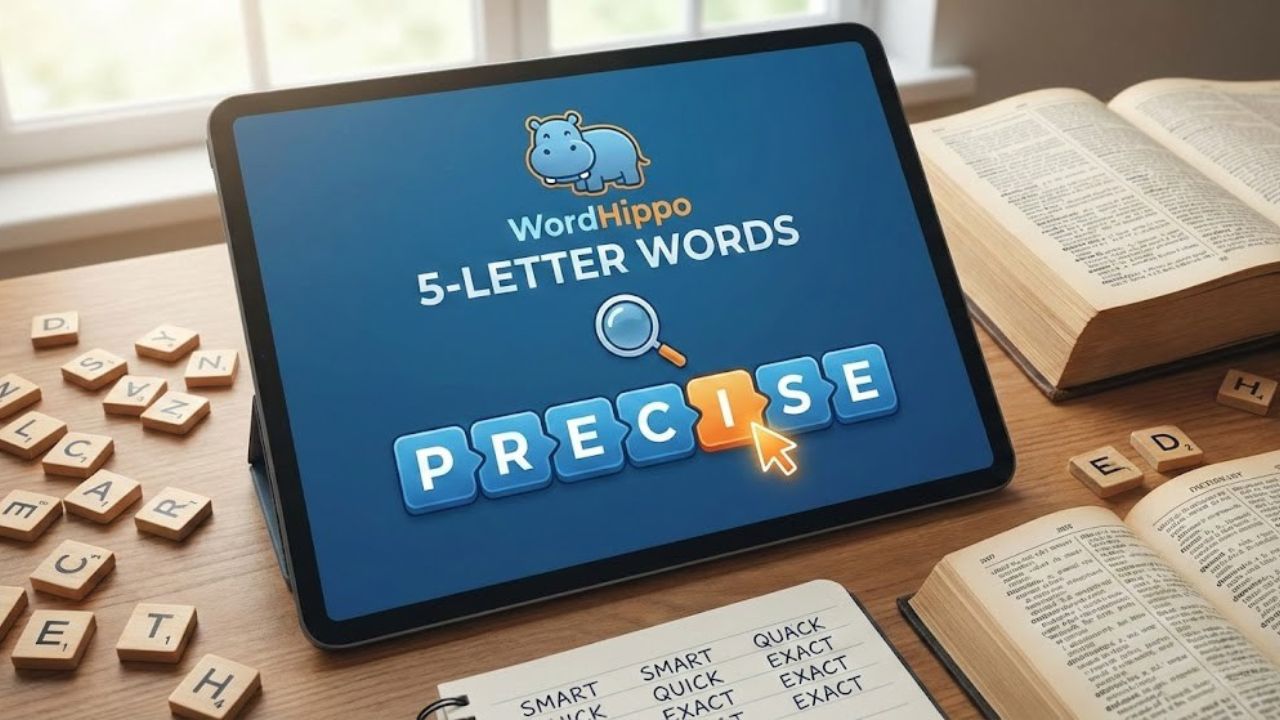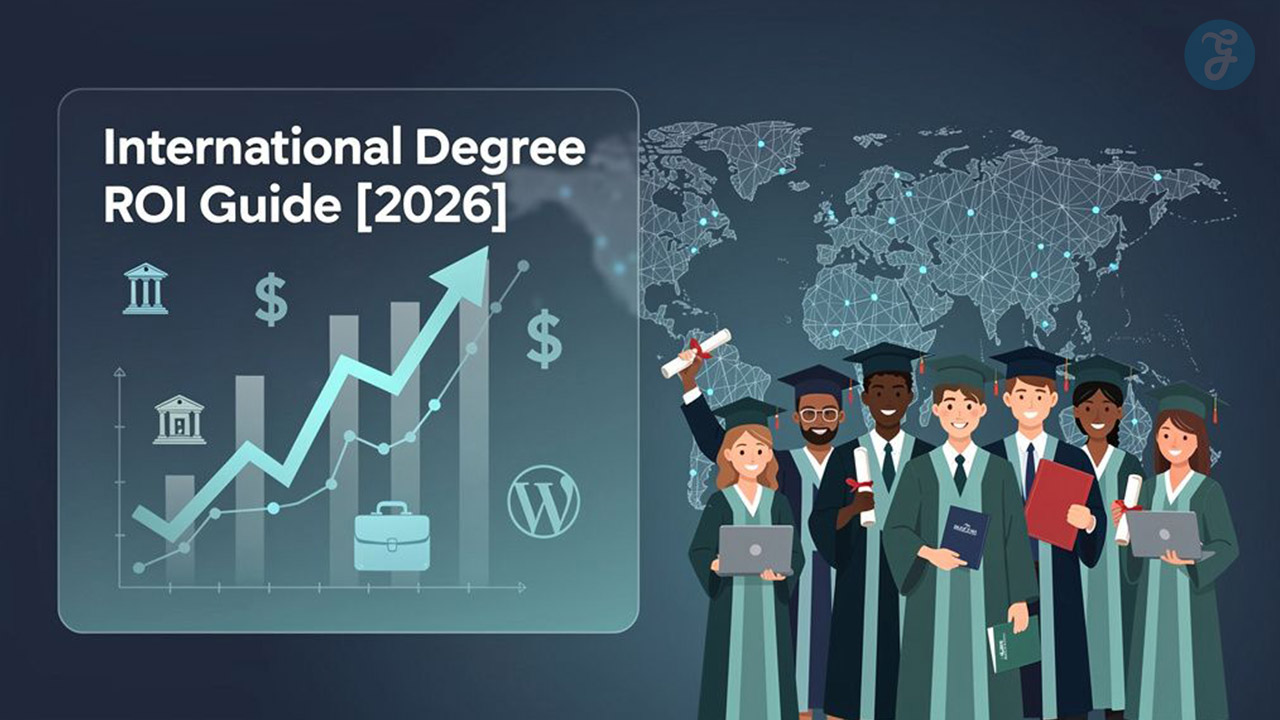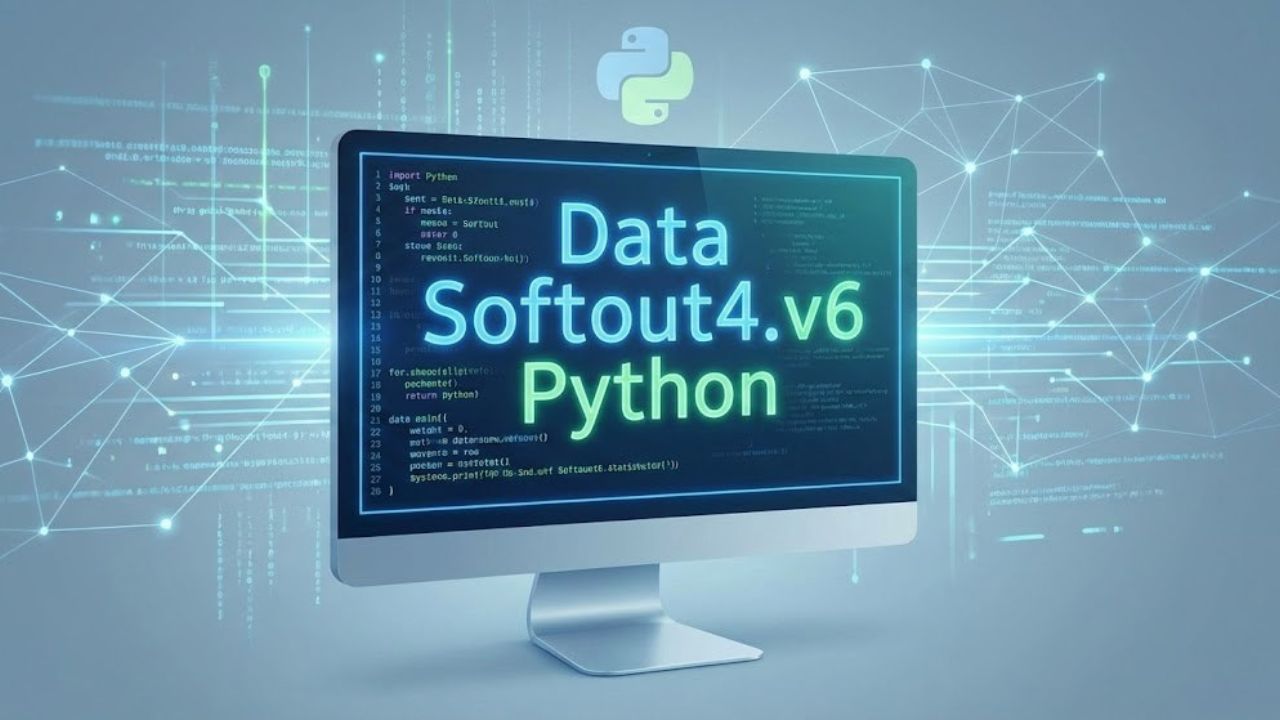In today’s world, news shapes our views and actions. But what if the news we trust isn’t all true? This worry grows as artificial intelligence (AI) plays a bigger role in making and sharing news.
A key fact to know is that World Press Freedom Day 2025 will focus on AI’s big impact on journalism and media.
Our blog post talks about why AI ethics are crucial for keeping the news honest and free. We’ll look at how journalists can use AI safely to make sure we get real stories. Read on to learn more about protecting press freedom with AI ethics.
Key Takeaways
- World Press Freedom Day started in 1993 to support journalists’ rights. The event on May 3, 2025, will talk about AI’s effects on news.
- AI changes how we make and share news. It can spread false information, which is bad for trust in media. Ethical use of AI in journalism is very important.
- Journalists face challenges with AI, like job loss and the quick spread of misinformation. They need ethical rules for using AI to keep news honest.
- The UNESCO/Guillermo Cano World Press Freedom Prize honors brave journalists. This prize shows how important free press is for democracy.
- Keeping media free helps everyone by making sure we get true stories. On World Press Freedom Day 2025, people will focus on proper use of AI in news to protect our right to know the truth.
Importance of World Press Freedom Day
World Press Freedom Day is vital for recognizing the rights of journalists. It highlights the need to protect press freedom and supports those who report the news.
Origins and purpose of the day
World Press Freedom Day started in 1993. It was created by the United Nations to raise awareness about press freedom around the world. This day honors the brave journalists who fight for free speech and media independence.
The purpose is clear: celebrate and protect the rights of journalists everywhere.
The focus for World Press Freedom Day 2025 will be on how AI affects journalism and media. As technological advancements grow, they can both help and harm news reporting. Ethical concerns arise with AI-generated content, which can spread disinformation and hurt local journalism.
Journals must keep their freedom to report without fear of censorship or bias.
Celebrating fundamental principles of press freedom
Press freedom is essential for democracy. It allows people to share information freely and safely. World Press Freedom Day celebrates this right every year on May 3. This day reminds us of the value of free media around the globe.
Journalists play a key role in keeping societies informed and engaged.
The rise of artificial intelligence (AI) poses new challenges for press freedom. AI can spread false information quickly. This threatens trust in local journalism, which is vital for communities.
Ethical concerns must be at the forefront as we embrace technology in news reporting. The future of news relies heavily on ensuring that AI is used responsibly and ethically within journalism practices and media institutions.
Impact of Artificial Intelligence (AI) on Journalism and Media
AI changes how we create and consume news. It brings new risks to press freedom and challenges the work of journalists everywhere.
Threats to press freedom in the AI era
AI poses serious threats to press freedom. It can create content that spreads false information. This hurts local journalism and damages trust in the news. Journalists face many challenges as AI tools change their work every day.
Jobs may be lost, or reports may rely too much on machines instead of human insight. The use of AI raises big ethical questions about how news is made and shared. World Press Freedom Day 2025 will discuss these issues and highlight the need for responsible use of AI in journalism.
Challenges faced by journalists
Journalists face many challenges today. The rise of AI has changed the way news is made. AI can create content quickly, but this raises issues about trust. Misinformation spreads fast through these tools.
This undermines local journalism and threatens media independence. Journalists must compete with machine-generated stories that may not be accurate.
Ethical concerns grow as AI becomes more common in reporting. There are worries about how this technology is used in the news industry. Reporters feel pressure to adapt while keeping their work honest and transparent.
The International Federation of Journalists says that AI cannot replace human journalists. Ethical guidelines are needed for responsible use of AI in news to protect freedom of speech and press freedom.
The Role of AI Ethics in Protecting Press Freedom
AI ethics plays a key role in keeping press freedom safe. It guides how journalists use AI tools and helps them stay accountable to the public.
Ethical concerns with AI in journalism
AI impacts the field of journalism in many ways. It raises serious ethical concerns. AI can create content that spreads false information. This can hurt trust in local journalism, which is vital for communities.
The use of AI also brings questions about transparency and accountability. Journalists must ensure their work is reliable, even when using AI tools.
The International Federation of Journalists says humans cannot be replaced by AI. Human journalists bring unique skills and insights to their work. With the rise of AI-generated news, it is crucial to set clear guidelines on how to use these tools responsibly.
Ethical practices will help protect press freedom as we move forward into this new age of journalism.
Need for responsible use of AI in news
The use of AI in journalism raises important ethical questions. In the age of AI, news can quickly spread online. Some AI-generated content may not be true. This can harm trust in local journalism.
World Press Freedom Day 2025 highlights these issues.
Responsible use of AI is key to protecting press freedom. Journalists must ensure that AI helps, not harms, their work. The recommendations by the IFJ stress that human journalists cannot be replaced by machines.
Ethics should guide how we use technology in news reporting. Only then can we defend media freedom and keep democracy strong.
Commemoration of World Press Freedom Day 2025
World Press Freedom Day 2025 will feature a major global event. It highlights the work of journalists and their vital role in democracy.
Signature Global Event
The signature global event for World Press Freedom Day 2025 will shine a light on the challenges of AI in journalism. This day highlights how AI shapes and changes news reporting. Journalists face new threats as AI can spread false information, making it hard to trust local media sources.
The celebration honors journalists who protect democracy through their work.
During this event, discussions will focus on the need for ethics in AI use within journalism. UNESCO will present the Guillermo Cano World Press Freedom Prize to recognize those who defend media freedom.
It is important to address ethical issues surrounding AI to ensure a free press survives in our changing world.
Celebration of journalists and media’s role in safeguarding democracy
Journalists play a key role in protecting democracy. They inform the public and hold power accountable. Their work helps people make informed choices. Celebrating their efforts is essential, especially on World Press Freedom Day 2025.
This year, the focus is on how AI impacts journalism and media.
AI can spread false information that harms trust in local news sources. Ethical concerns about AI highlight the need for responsible use in journalism. Journalists must navigate these challenges to keep democracy strong and free from misinformation.
Keeping press freedom intact benefits everyone in a democratic society.
UNESCO/Guillermo Cano World Press Freedom Prize
The UNESCO/Guillermo Cano World Press Freedom Prize honors journalists who have shown courage in their work. This prize highlights the importance of press freedom and celebrates those who defend it.
It aims to shed light on the risks journalists face, especially in today’s world where AI impacts journalism and media.
World Press Freedom Day 2025 will focus on how AI affects news reporting. Ethical use of AI is vital for protecting press freedom. The award emphasizes that we must support media independence and stand against disinformation caused by AI-generated content.
Importance of defending media freedom
Defending media freedom is vital for democracy. It allows journalists to report the truth without fear. World Press Freedom Day 2025 highlights this need. AI has a large influence on how news is shared today.
AI-generated content can spread lies and hurt trust in local journalism. This makes it more important than ever to protect press freedoms.
Many challenges come with using AI in news reporting. Ethical issues must be addressed to ensure responsible use of AI in journalism. The future of news depends on these ethical concerns, as stated by the IFJ, which believes that human journalists are irreplaceable.
Strong protections for media freedom help keep our societies informed and strong.
Takeaways
World Press Freedom Day 2025 highlights the need for ethics in AI and journalism. AI shapes how we get news today. It can mix truth with lies, which harms trust in media. Protecting press freedom is crucial for democracy.
We must think about these issues to ensure a fair future for news.
FAQs on World Press Freedom Day 2025
1. What is World Press Freedom Day 2025: Why the Future of News Depends on AI Ethics about?
World Press Freedom Day 2025: Why the Future of News Depends on AI Ethics is a global commemoration that focuses on journalism ethics and how artificial intelligence impacts news reporting.
2. How does artificial intelligence impact journalism ethics?
Artificial Intelligence can affect journalism ethics by influencing how news stories are selected, reported, and distributed. The ethical use of AI ensures unbiased, accurate, and fair reporting.
3. Why is World Press Freedom Day important for journalists?
World Press Freedom Day highlights the importance of free speech and press freedom around the world. It’s an opportunity to discuss issues like AI ethics in journalism.
4. How will AI shape the future of news?
AI has potential to revolutionize news by automating processes and personalizing content delivery. However, it’s crucial that its usage adheres to strict journalism ethics to maintain trustworthiness.


